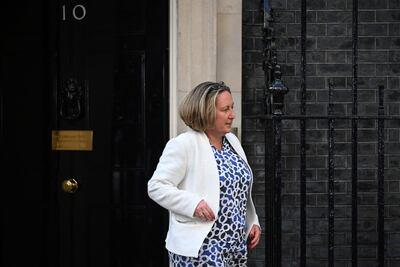Negotiations on a new trade deal with Israel are set to begin on Wednesday as the UK looks to boost its services industry.
Trade Secretary Anne-Marie Trevelyan will meet Israeli ambassador Tzipi Hotovely in London for talks on expanding the current UK-Israel deal to include services exports.
Trade between the UK and Israel is currently worth £5 billion ($5.99bn) a year, but the existing free-trade agreement covers only commerce in goods, meaning services account for only a third of trade between the two countries.
The UK hopes to take advantage of Israel’s booming services sector, which has grown by more than 50 per cent in the past 10 years, and the government expects a new agreement to boost UK services exports to Israel by £78 million a year.
“The UK and Israel are both modern, high-tech services superpowers, but our current trading relationship is based on an agreement from 1995, before smartphones, the internet and digitally delivered services transformed the global economy," Ms Trevelyan said.

“We want a deal that will play to British strengths, while stimulating innovation and increasing opportunities for small and medium-sized enterprises across the UK. Combining the power of our economies in a revamped trade deal will boost trade, support jobs and help take our economic relationship to the next level.”
Potential opportunities include procurement contracts for the £34 billion Tel Aviv Metro project and expanding on the Leeds-Israel Innovation Healthtech Gateway that has already led Leeds Teaching Hospitals to team up with Israeli health technology firms.
Amanda Tickel, head of tax and trade policy at consultants Deloitte UK, said: “We welcome negotiations between the UK and Israel on an enhanced FTA, which could take our bilateral trade and investment relationship to a new level.
“Both the UK and Israel are services-led economies with highly successful tech sectors, yet the existing terms of trade contain only limited provisions in these areas. This negotiation represents an exciting opportunity for UK services exporters, making it easier to trade across borders, to travel and work in each economy and support our digital innovators.”
The trade negotiations come after the signing of an agreement between the UK and Israel in November 2021 in which both committed to developing a new “bilateral road map” covering co-operation in diplomacy, trade, defence and development, among other areas.
But human rights campaign group Amnesty International raised concerns that any deal would allow goods produced in Israeli settlements within the Occupied Palestinian Territories to be described as coming from Israel.
Peter Frankental, Amnesty’s economic affairs director for the UK, said: “In their haste to agree a shiny new trade deal with Israel, there’s a distinct danger that UK negotiators will fail to ensure absolute clarity over the precise origins of goods destined for the UK market.
“Unfortunately, the faulty EU-Israel trade arrangement is currently allowing Israeli exporters to pass off settlement goods as Israeli ones. A UK free-trade agreement needs to be distinctly better than this.”


